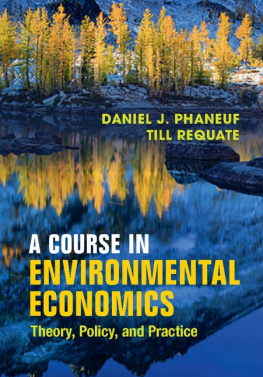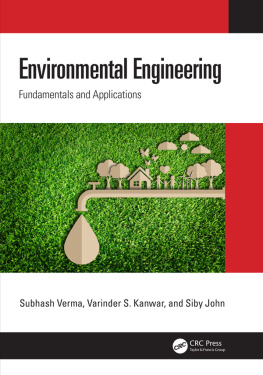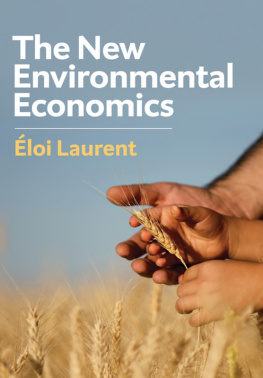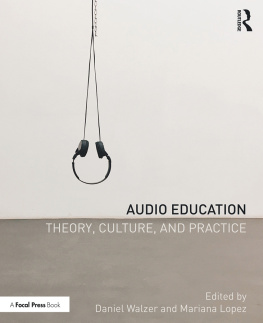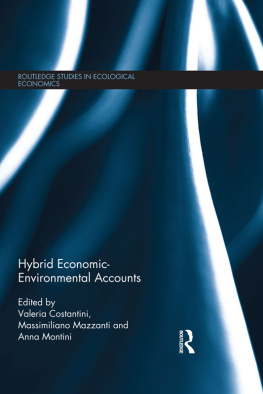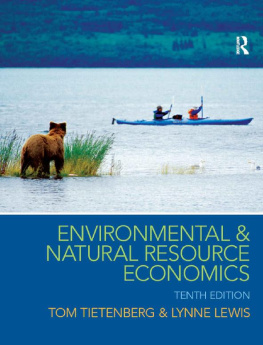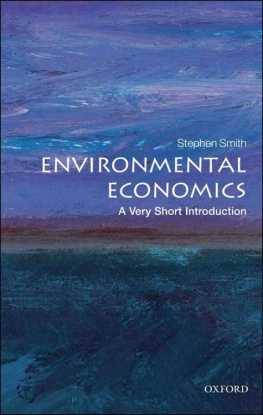This unique graduate textbook offers a compelling narrative of the growing field of environmental economics that integrates theory, policy, and empirical topics. Authors Daniel J. Phaneuf and Till Requate present both traditional and emerging perspectives, incorporating cutting-edge research in a way that allows students to easily identify connections and common themes. Their comprehensive approach gives instructors the flexibility to cover a range of topics, including important issues such as tax interaction, environmental liability rules, modern treatments of incomplete information, technology adoption and innovation, and international environmental problems that are not discussed in other graduate-level texts. Numerous data-based examples and end-of-chapter exercises show students how theoretical and applied research findings are complementary, and will enable them to develop skills and interests in all areas of the field. Additional data sets and exercises can be accessed online, providing ample opportunity for practice.
Daniel J. Phaneuf is Professor of Agricultural and Applied Economics at the University of Wisconsin-Madison. He has been Managing Editor of the Journal of Environmental Economics and Management , and is currently Editor in Chief of the Journal of the Association of Environmental and Resource Economists . He is a member of the US Environmental Protection Agency Science Advisory Board and also serves on the board of directors for the Association of Environmental and Resource Economists. His many research articles have appeared in top field and general economics outlets, and he has won awards for his graduate and undergraduate teaching in environmental economics and econometrics.
Till Requate is Professor for Economic Policy at Kiel University, Germany. He was previously Professor for Environmental Economics and Director of the Interdisciplinary Institute of Environmental Economics at Heidelberg University. He is currently Managing Editor of the Journal of Environmental Economics and Management and Associate Editor of Resource and Energy Economics , and was Chairman of the German Association of Environmental and Resource Economists. He won the European Association of Environmental and Resource Economics Erik Kempe Award for the best paper in 2004 and the German Society of Health Economics best paper award in 2013. His research articles have appeared in top field and general economics outlets.
Daniel J. Phaneuf
University Printing House, Cambridge CB2 8BS, United Kingdom
One Liberty Plaza, 20th Floor, New York, NY 10006, USA
477 Williamstown Road, Port Melbourne, VIC 3207, Australia
4843/24, 2nd Floor, Ansari Road, Daryaganj, Delhi 110002, India
79 Anson Road, #06-04/06, Singapore 079906
Cambridge University Press is part of the University of Cambridge.
It furthers the Universitys mission by disseminating knowledge in the pursuit of education, learning, and research at the highest international levels of excellence.
www.cambridge.org
Information on this title: www.cambridge.org/9781107004177
10.1017/9780511843839
Daniel J. Phaneuf and Till Requate 2017
This publication is in copyright. Subject to statutory exception and to the provisions of relevant collective licensing agreements, no reproduction of any part may take place without the written permission of Cambridge University Press.
First published 2017
Printed in the United States of America by Sheridan Books, Inc
A catalogue record for this publication is available from the British Library
Library of Congress Cataloging-in-Publication Data
Names: Phaneuf, Daniel J. (Daniel James), author. | Requate, Till, 1957 author.
Title: A course in environmental economics : theory, policy,
and practice / Daniel J. Phaneuf, Till Requate.
Description: New York, NY : Cambridge University Press, 2017. |
Includes bibliographical references and index.
Identifiers: LCCN 2016044938 | ISBN 9781107004177 (hardback) |
ISBN 9780521178693 (pbk.)
Subjects: LCSH: Environmental economics.
Classification: LCC HC79.E5 P5125 2017 | DDC 333.7dc23
LC record available at https://lccn.loc.gov/2016044938
ISBN 978-1-107-00417-7 Hardback
ISBN 978-0-521-17869-3 Paperback
Cambridge University Press has no responsibility for the persistence or accuracy of URLs for external or third-party Internet Web sites referred to in this publication and does not guarantee that any content on such Web sites is, or will remain, accurate or appropriate.
For Tammo, Finja, and Silke D.P.
For Sabine and Frederik T.R.
Contents
Figures
Tables
Preface
This book grew out of discussions we had more than ten years ago, when we were both teaching graduate courses in environmental economics at our respective universities in Germany and the United States. Though our interests and skills were different Requate is a theorist/experimentalist, and Phaneuf an empiricist we both had the sense that there was something missing in the textbooks notational convention; (b) included contemporary and advanced topics missing in other sources; (c) reflected the increasingly empirical nature of environmental economics; and (d) conveyed the excitement and dynamism of a growing field. This book is our attempt to meet that need.
Our vision for the book is best explained by discussing its organization. We have divided the material into four parts. e.g. emission taxes, cap and trade programs, emission subsidies are equivalent in their economic efficiency properties.
Our economics has matured beyond an application of the theory of public goods and externalities to the environment.
The last four chapters of their connection to climate change and non-renewable resource policy.
Throughout ).
and identification of topics that we believe provide important opportunities for future research.
A distinguishing feature of the book is that we have used a single notational scheme across the four parts of the book in order to connect the various topics and minimize the cost of entry into each new concept. We have also included numerous numbered examples, which we use to describe relevant empirical) houses data for the empirical exercises as well as supplemental information and errata.
Finally, we have included a further reading section at the end of each chapter. It is here that we identify the original source material our discussion has drawn on, and highlight related and in some cases recent research contributions to the area. We have used this approach for two reasons. First, we wrote using a narrative format rather than a review article format, meaning we tried to avoid breaking the flow of description with a large volume of parenthetical references. Thus our citations in the main body of the chapters are usually reserved for attribution of specific ideas, identification of classic sources, and acknowledgment when we have used published material as a model for our textbook presentation. Second, we wanted to have a specific section in each chapter that would serve as a literature-organizing vehicle, where we could classify different areas of inquiry that fit under the chapters broad themes. We emphasize that our further reading sections are designed to be illustrative rather than comprehensive, and so we have not included citations to many (or even most) of the relevant papers. That said, a book this long that unfolded over many years will undoubtedly have failed to give proper credit in many places, and so the books website will include expanded versions of our further reading sections, which will be updated periodically.

